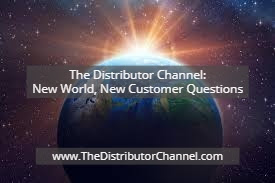A New World Means New Customer Questions
 Friday, March 13, 2020: A day deeply burnt into our
Friday, March 13, 2020: A day deeply burnt into our memories, the day the Coronavirus Pandemic became real, the day our economy shut down and the day distributors and their customers suspended in-person sales activities. We quickly adapted; switching to phone calls, Zoom Meetings, and other telesales activities.
Early on, the phone calls were easy. We commiserated on the drawbacks of working from home, discussed available customer resources, and showcased a few new products. The calls flowed and each week we discovered some new ground without boring the customer.
Today, some 11 weeks later, salespeople are struggling to keep the phone conversations fresh. To use a colloquialism from an old-time seller, “We’ve fished this pond to death.”
 Aside from normal sales call conversations, salespeople depend on non-verbal clues to generate new selling opportunities. For instance, during a quick walk through the customer facility, they might see a pile of parts stacked near a conveyor and learn of a manufacturing issue. Those who call on maintenance departments might see a greasy (and broken) part on their customer’s desk. A quick inquiry leads to a discussion of the short life span of the part in the customer’s application and an opportunity to suggest a solution. These non-verbal clues don’t exist when calls are made remotely.
Aside from normal sales call conversations, salespeople depend on non-verbal clues to generate new selling opportunities. For instance, during a quick walk through the customer facility, they might see a pile of parts stacked near a conveyor and learn of a manufacturing issue. Those who call on maintenance departments might see a greasy (and broken) part on their customer’s desk. A quick inquiry leads to a discussion of the short life span of the part in the customer’s application and an opportunity to suggest a solution. These non-verbal clues don’t exist when calls are made remotely.Now is the time to expand not only the questions we are asking but also the people with whom we are speaking at our customers. The list below is intended to give you some additional tools for selling strategy. Each of these questions can be asked over the phone or in person. We have separated the questions based on the responsibilities of your customer contact:
Upper Management
- Do you have a strategic vision for your company after the pandemic?
- What fundamental changes do you see in your business following the coronavirus pandemic?
- Changes in the financial realities of your operation?
- What kind of paybacks will you be looking for in future investments?
- Are there new customer segments you feel your business will pursue with greater vigor as time moves forward?
- How might the needs of these new segments differ from previously targeted customers?
- Has there been a change in the skill sets you will need to employ as we move into the future?
- Which procedures/policies do you feel might be obsolete in post-pandemic times?
Production Managers
- How have safety guidelines changed the way you do things on the production floor?
- Are you one of the companies required to operate with fewer people?
- How did you handle that?
- If required to run extra or overlapping shifts, were there any issues?
- What post-virus issues are holding you back from producing more products?
- Has social distancing caused any additional bottlenecks in the process?
- Are new areas properly guarded and OSHA Compliant?
- Did your packaging needs change based on the COVID virus?
Safety Managers
- How has the coronavirus pandemic impacted plant safety in your company?
- Do you see the safe guarding of machines changing because of the pandemic?
- What new equipment has been added that has yet to be inspected for safety guarding?
- What are the major issues facing your company from a safety standpoint over the next two years?
- Are there any new governmental regulations you see coming in the post-pandemic days?
- Will you be conducting safety training after individuals return to work following furloughs and other work stoppages?
Sales/Marketing Groups
- Are customers asking for anything different since the coronavirus?
- Which of your customers is most actively buying or exploring new purchases?
- How has this changed over the 3-4 months since the coronavirus outbreak?
- Are there new segments you see as expanding their purchases?
- Do you see their needs differing from customers of the past?
- Are these customers asking for different technologies than traditional customers?
- Would it help if sales/marketing people were briefed on the technologies?
Engineering Managers
- Are there new technologies you have been considering since the coronavirus epidemic?
- Which older technologies you have decided to maintain rather than replace?
- If you were going to add an additional skill set to your team, what would that be and why?
- Do you have spare parts for existing systems that might be obsolete?
- What new training might be needed in the future?
- If you were to identify the biggest bottlenecks in your design efforts, what would they be?
- Do you see post-corona issues changing these?
- Have you been charged with attacking parts shortage or material flow issues?
Engineers
- Has your company changed any specifications based on the Coronavirus situation?
- What are some of the things impacting your work today?
- Do you see better ways of doing things that have been ignored because of coronavirus issues?
- Do you see a need to revise specifications based on the post-pandemic business environment?
Maintenance People
- Do you have any equipment with “oddball” spares? Do you have a source for them?
- Have you been asked to modify or change anything in your process to better align with the post-coronavirus environment?
- Do you believe your company will be changing the number of spare parts on hand as we come out of the COVID situation?
- Are you being asked to support new technologies because of the virus situation?
- Does your facility make use of outside contractors to handle specialized equipment? Do you see this continuing after the pandemic?

Questions are a powerful sales tool
Experts say questions are the single most powerful tool in selling. My guess is you’ve developed and used a surprisingly good arsenal of questions. Now is the time to add even more to your list. Extending further, based on my opening comments, most of the questions we ask are situational and come to us on the spur of moment.
We are working in a once in a lifetime environment. Why not consider expanding the people you talk to and polishing up
some new questions. Consider the list we have provided as a primer for developing your own. And, if you feel you have something powerful, please share. Everyone who sends me a question they have used will receive their very own postcard from Iowa.
Happy selling….
Frank Hurtte is the Founding Partner of River Heights Consulting. He combines the battle scars of 28 years of front line "in the trenches" experience with over 13 years of service to knowledge-based distributors and their manufacturer partners.
Emailfrank@riverheightsconsulting.com or call today for a free 30-minute consultation!
.





Comments
china micro switch manufacturer